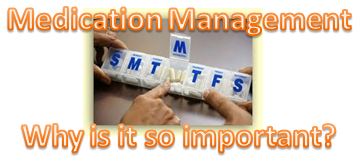
30% of hospitalizations for elders are thought to result from drug-related problems/toxicity. Adverse drug effects have been linked to falls, depression, constipation, confusion and immobility. If medication errors were counted as a disease, they would be the 5th leading cause of death among seniors 65 and older.
Did you know? Some interesting facts about medications, medication management and senior medication issues:
- Some foods can interact negatively with medication and certain medications should be taken properly in relation to food/drink.
- Over-the-counter medications, vitamins and herbal remedies should all be analyzed when your treatments are being reviewed. These can have side effects or interactions with prescription medications.
- Medications are metabolized differently in elders.
- Certain medications commonly prescribed for behavioral issues can have serious negative effects on elders with dementia and can, in fact, exacerbate the various behaviors they would typically treat.
Need help with medication management concerns in the Tampa Bay area? We can provide a range of services from assessments through ongoing senior care management–in Pinellas, Pasco and Hillsborough counties (Tampa, Clearwater, St. Petersburg):
When properly managed, medications can be a vital part of the good senior healthcare. When not properly managed, the dangers can have a significant impact. For older adults who tend to take multiple medications, the risks are inherently high. This may be complicated by poor coordination and communication among multiple clinicians, patient compliance difficulties due to memory issues or practical problems and interactions/sensitivities.
Research shows that multi-faceted medication management programs lead to the best treatment outcomes and minimize mistakes.
Aging Wisely’s geriatric care managers support clients in staying safe and healthy with an individualized approach to senior care coordination, with benefits such as:
- Assessing comprehensive areas including medication management and overall management of your medical conditions and senior care needs; providing senior care resources that best meet your individual needs.
- Ensuring your clinicians are equipped with the best information: attending your medical appointments, keeping your records updated and communicating with your medical team and providing feedback so they can pinpoint problems early.
- Advocating with your medical providers to review medications, reduce overuse of medication and simplify schedules. Fewer medications make it easier for people to correctly take their medications and can reduce interactions/side effects.
- Ensuring your medications work most effectively by linking you to specialists, such as a geriatric pharmacy consultant, to review and pinpoint the best regime.
- Providing solutions that help YOU: offering advice on devices and technologies that will best meet your needs, from pill boxes to medication dispensers and reminder systems.
- Determining what type of personal assistance might be needed, such as engaging home health medication management including a Registered Nurse to set up your pill box and home health aides for medication reminders and assistance.
- Assisting with communication and advocacy: tracking allergies and history, providing background information to clinicians and helping you to ask the right questions.
- Managing transitions (such as a move to a care facility, hospitalization and discharge) to reduce mistakes, redundancies and problems.
It is vital to assess and manage medication regimes on an ongoing basis since they can have such major impacts on a person’s health and quality of life. If you have questions or know someone who might need help getting better senior care outcomes, give us a call at 727-447-5845!
 Popular Downloads
Popular Downloads


 Get Our Newsletter!
Get Our Newsletter! Mission Statement
Mission Statement

